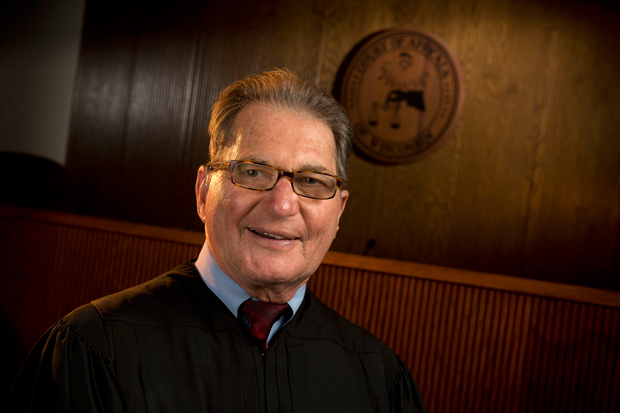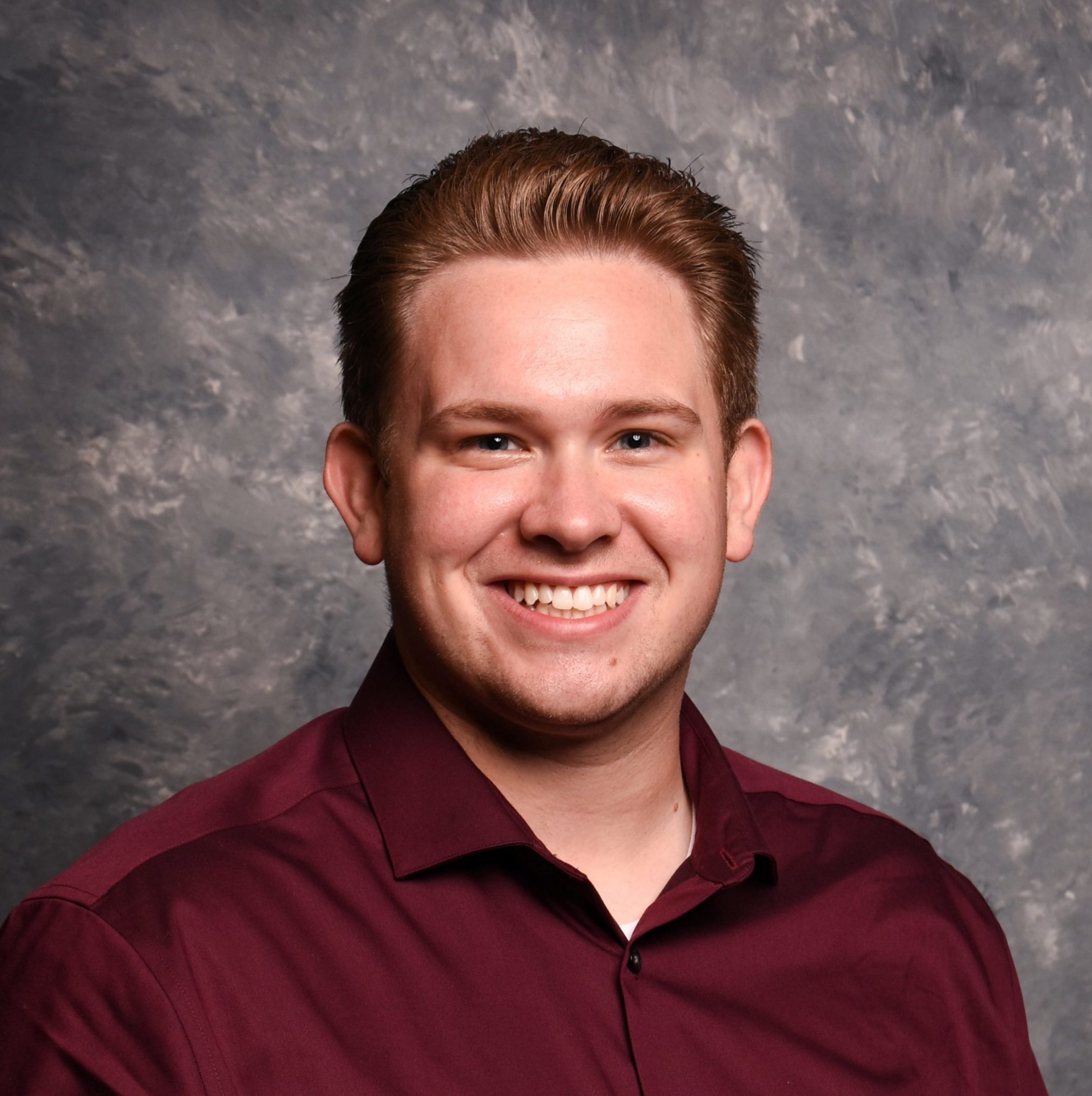Brown delivers: Retiring judge will miss writing opinions, but not reading briefs
By: Erika Strebel, [email protected]//May 22, 2015//
Brown delivers: Retiring judge will miss writing opinions, but not reading briefs
By: Erika Strebel, [email protected]//May 22, 2015//

Chief Judge Richard Brown loves the creative process of writing opinions. It’s one of the things he will miss most when he leaves his longtime post with the state Court of Appeals on Aug. 1.
After the judges come out of a decision conference with an outline of what they have agreed on, that’s where the fun for Brown starts. He said he’s developed a writing style he is proud of and known for. Brown said he spends a lot of time on the first paragraph of an opinion.
“It’s like the center of the atom, and I’m showing that center right away so that everyone knows where this case is headed,” he said. “The shorter I can make that paragraph, the better. Sometimes that doesn’t work.”
But crafting an opinion is not always easy. Sometimes, a judge on a panel might want to add something or spend more time on a particular topic. But for Brown, that just adds to the fun.
“This back and forth is a very intellectual discussion,” he said. “And when I said it’s fun, I’m not kidding. It’s really fun to go back and forth and talk about this stuff. And it helps the writer because we crystallize what it is we want to say when we have these debates.”
But Brown cautions that while he may have written an opinion, that doesn’t always mean the opinion expresses his ideas alone.
“That opinion may have my name on it,” he said. “But the other two judges had a hand in it.”
Brown has also spent his 37 years on the bench doing things that are not so much fun.
The one thing about the job he’ll miss the least, he said, is reading briefs twice a month. It takes about three days to prepare for each of those conferences.
“That is difficult work because some briefs are not so hot,” he said. “And you have to actually lift yourself up and make yourself get into the record and get into the law and make up the difference when the lawyer has not done his or her job.”
It would be great, he said, if all briefs were easy to read and understand, “… but life isn’t perfect and neither are lawyers. And neither are judges.”
What ultimately outweighs the tedium of that part of the job is his desire to get things right.
“I don’t want to look dumb or say something at conference that is not well thought-out,” he said. “I want to read the briefs and I want to do my own research so I can come into conference confident in every case that I have a handle in the issue and that I have a handle in the law.”
Brown is the last of the Court of Appeals’ 12 original judges. A major change in the court is that they no longer meet in person as often as they did when the court first started in 1978. At the time, he said, everyone was freshly elected, and they were focused on crafting the court’s procedures.
“If you really wanted to get something done those days,” Brown said. “You met in person. And that’s what we did.”
But now, they meet once a year and communication between districts is done by email and text.
“It’s because technology has changed the way we communicate,” he said. “It’s just as easy for us to email or text, even, or use our cellphone … as it is face to face – easier, in fact.”
That hasn’t cheapened the process, Brown said, but he does miss the old days when the judges got together. He said they all got to know each other very well, but now the judges rarely see each other.
And more change is to come, he predicts. Lawyers will soon have to change how they write briefs so they can be easily read on a screen.
“I predict that 10 or 15 years from now the court will be filled with judges who do everything online and wouldn’t even think of picking up a printed brief and actually reading that printed brief. They would think it was old-fashioned … something from ancient history.”
Wisconsin Law Journal: Where is your favorite vacation spot or place to relax?
Judge Richard Brown: I love Hawaii. I’ve been there a few times. I’ve enjoyed every time I’ve been there. Of course, there’s a lot of places in the world I haven’t been yet. Once I’m retired, maybe I’ll find another spot I love more.
WLJ: What’s something that many people don’t know about you?
Brown: Love for sci-fi novels. I really like to read science fiction. I started with Isaac Asimov and several other authors. I just finished reading John Scalzi, about three or four books from him. Very, very interesting. I just get a sense that the future is going to unlock more secrets about who we are and why we’re here. And I look at science fiction writers as writing about those things. I find it really, really interesting. They’re philosophers who write fiction. So I hold them in high regard in that way.
Also, I miss music very, very much. I lost my hearing in 1983. The last song I heard was ‘Dust in the Wind.’ … Every once in awhile, my cochlear implant will pick up a song. It’s just so joyful to me. I was cleaning the house once and Bolero came on the radio and I was able to hear the whole thing. It was as if my hearing came back for those few minutes. It was great. Most of the time it’s just noise. I don’t know why that is. I’ve talked to a doctor about it. …
What the cochlear implant does is it tries to mimic the sound waves of the normal air. And because it isn’t perfect, you don’t get it. … It’s rich sound, it’s just not the right sound. (The doctor) said every once in the while the mimicking is right there. There’s no discrepancy. Why that happens, they don’t know. I almost wish it doesn’t happen because it makes me miss it more.
WLJ: What have you learned about yourself while you’ve been on the bench?
Brown: I think of myself as much more involved in the law, the rule of law. The rule of law, that’s just a phrase. To most people it means you follow the law. That’s just the surface. What I like to do is get underneath it and why we have that law, why is it there and what made it come about. … I’m proud of myself that I do that because I feel like I’m really getting it. … I stopped being a technician. I learned that I could do that, and it was fun.
Legal News
- Former law enforcement praise state’s response brief in Steven Avery case
- Eric Toney announces re-election bid for Fond du Lac County District Attorney
- Former Wisconsin Democratic Rep. Peter Barca announces new bid for Congress
- Republicans file lawsuit challenging Evers’s partial vetoes to literacy bill
- More human remains believed those of missing woman wash up on Milwaukee Co. beach
- Vice President Harris returning to Wisconsin for third visit this year
- Wisconsin joins Feds, dozens of states to hold airlines accountable for bad behavior
- Trump ahead of Biden in new Marquette poll
- Bankruptcy court approves Milwaukee Marriott Downtown ‘business as usual’ motion
- New Crime Gun Intelligence Center to launch in Chicago
- Arrest warrant proposed for Minocqua Brewing owner who filed Lawsuit against Town of Minocqua
- Wisconsin Supreme Court justices question how much power Legislature should have
WLJ People
- Power 30 Personal Injury Attorneys – Russell Nicolet
- Power 30 Personal Injury Attorneys – Benjamin Nicolet
- Power 30 Personal Injury Attorneys – Dustin T. Woehl
- Power 30 Personal Injury Attorneys – Katherine Metzger
- Power 30 Personal Injury Attorneys – Joseph Ryan
- Power 30 Personal Injury Attorneys – James M. Ryan
- Power 30 Personal Injury Attorneys – Dana Wachs
- Power 30 Personal Injury Attorneys – Mark L. Thomsen
- Power 30 Personal Injury Attorneys – Matthew Lein
- Power 30 Personal Injury Attorneys – Jeffrey A. Pitman
- Power 30 Personal Injury Attorneys – William Pemberton
- Power 30 Personal Injury Attorneys – Howard S. Sicula











